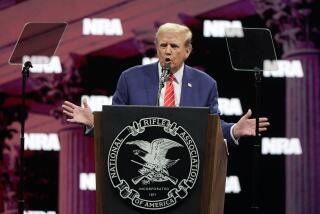Clinton Blasts House, Gun Lobby in Likely Preview of Campaign Theme
- Share via
WASHINGTON — Previewing a probable Democratic message for the 2000 political campaign, President Clinton depicted the Republican-led House on Saturday as out of touch with the country and a pawn of the gun lobby following the lawmakers’ inability to pass a gun control bill.
Given that the gun issue divides both parties--a Democrat played a key role in derailing the gun control bill late last week--Clinton did not directly chide Republicans. Instead, he focused his fire on the gun lobby, accusing it of using its political clout to kill modest legislation that aimed to take firearms out of children’s hands.
“Time and again the gun lobby has used every weapon in its arsenal to defeat any effort to strengthen our gun laws, no matter how sensible,” Clinton said in his weekly radio address. “. . . It sadly happened again.”
But with Republicans controlling the House by a razor-thin margin--and Democrats gearing up for a major effort to retake the chamber in next year’s election--Clinton clearly had the GOP in mind in decrying the defeat of the gun control effort.
He insisted that the “sensible, moderate” gun control proposals he sought were not “a partisan issue anywhere else in America; it shouldn’t be a partisan issue in Washington.”
He also urged Congress not to give up on the issue, saying there is “still time” to pass stronger gun controls.
The Senate, responding to public anguish after the April high school massacre in Colorado, passed a juvenile justice bill that included several gun control measures, such as a ban on imports of large-capacity ammunition clips and a requirement that all handguns be sold with a safety device. The House passed a juvenile justice bill Thursday that lacked a gun control component, but compromise legislation this summer could include some of the Senate measures.
But after last week’s divisive House debate on gun control, it remains in doubt whether there would be much enthusiasm for forging a compromise on the issue this year.
And almost assuredly, the bid to further regulate firearm sales at gun shows--the subject of contentious debate in both the Senate and House--is dead. A proposal to require criminal background checks on those who purchase firearms from unlicensed dealers at gun shows passed the Senate only when Vice President Al Gore broke a tie vote. And in the House, it was the narrow passage of an amendment that foes said would actually weaken existing regulation of gun show sales that doomed overall gun control legislation.
Virtually all Democrats voted against the final bill, arguing that, although it contained some good provisions, the gun show amendment was a fatal flaw. Also opposing the bill were more than a third of House Republicans.
The gun show amendment was a textbook example of the politically complicated nature of the gun control issue. One of the deans of House Democrats, Rep. John D. Dingell of Michigan, wrote it and worked with the National Rifle Assn. to lobby for it.
Clinton used his Saturday address to try to give Democrats political cover for standing up to the gun lobby. He noted that since the 1994 passage of the Brady Bill, which mandated criminal background checks on those who purchase guns in stores, “we’ve got the lowest crime rate in 25 years, and the American people are safer, and honest hunters and sportsmen haven’t been hurt a bit.”
He added: “The American people understand that common-sense gun laws don’t infringe our rights; they protect our lives.”
Republicans wasted no time trying to turn the political tables on Clinton. Responding to the president’s address, Rep. J.C. Watts Jr. (R-Okla.) insisted that the House-crafted gun control bill was “a strong first step in protecting our children.”
Its defeat, Watts said, “wasn’t about Republicans. It wasn’t about the NRA. It was about [Clinton’s] scorched-earth policy that put total political victory ahead of our children.”
More to Read
Get the L.A. Times Politics newsletter
Deeply reported insights into legislation, politics and policy from Sacramento, Washington and beyond. In your inbox twice per week.
You may occasionally receive promotional content from the Los Angeles Times.










